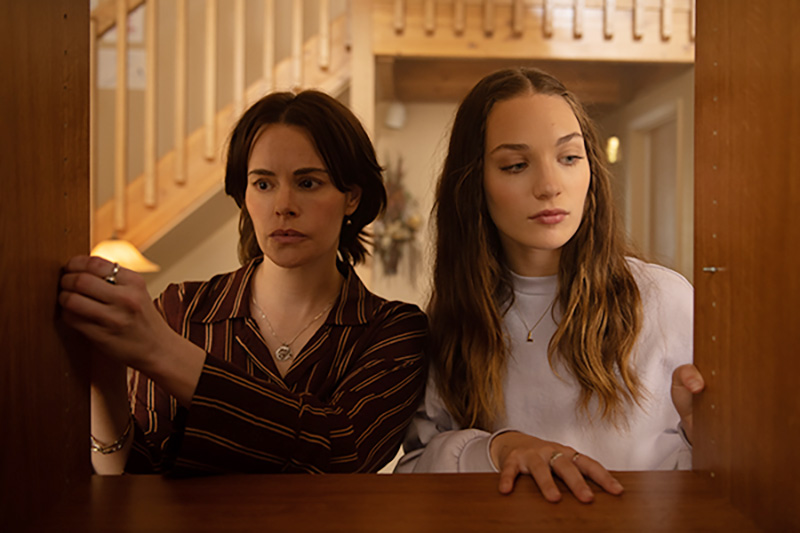Molly McGlynn Fitting In
by Thom Ernst – Film Correspondent
(February 5, 2024 – Toronto, ON) I had no reason to doubt that Mayer-Rokitansky-Kuster-Hauser syndrome was a real thing. I Googled it anyway—in case you doubted it.
Yes, it is accurate. Confirmed
It’s described as “a rare congenital disorder that affects the female reproductive system.”
The definition goes on to paint a more vivid image by describing the condition as being “characterized by an underdeveloped vagina and uterus.”
Had it not been for Fitting In (and knowing the details of the condition makes me appreciate the title even more), I would have remained in the dark.
I’m 65. I almost made it.
 But I doubt director Molly McGlynn made Fitting In with the expressed conceit of educating myself, or anyone, on the biological variants that can affect a woman’s reproductive organs.
But I doubt director Molly McGlynn made Fitting In with the expressed conceit of educating myself, or anyone, on the biological variants that can affect a woman’s reproductive organs.
So, I had a question: How did this term ever pop up in conversation long enough for anyone to formulate it into an idea for a film? Is the syndrome common knowledge, and once again, am I publicly displaying my naivety? I wouldn’t presume there is any first-hand experience by the filmmakers for two reasons: It’s far too personal of a presumption to make, and if the filmmakers had inside information, we’d have probably heard of it mentioned in subsequent interviews.
But so much for my review of the film’s title and theme; what of the movie?
Mayer-Rokitansky-Kuster-Hauser syndrome is the syndrome affecting Lindy (Maddie Ziegler), a teenage age girl in director Molly McGlynn’s latest film, who is ready to kick-start her sex life. Lindy has found the ideal young man-boy in Adam (D’Pharaoh Woon-A-Tai) to guide her through.

Adam is a decent enough boy, thoughtful, attentive, and respectful. But lack of patience and respect isn’t Lindy’s problem—aside from a fear of Adam not willing to wait forever. The problem is an inability to physically let sex happen.
Fitting In is a comedy, but McGlynn is too in tune with the devastating effect such a diagnosis would have on a young woman to play the affliction up for laughs. And neither does she ignore the emotional impact the news would have in other areas of Lindy’s life. The comedy in the film rests more in the simple quirks of the characters around her and sometimes in Lindy’s attempts to cover up the fact that she has yet to have her menstrual cycle.
Zeigler is good as Lindy. She turns Lindy into the defining role that could well mark a turning point in her career; it could be her Scarlett O’Hara or Annie Hall moment. McGlynn allows for it, giving Zeigler’s Lindy the space to reflect, observe, react, and act on all things, internal and otherwise.
Regarding comedy, the heavy lifting is left to the film’s side characters. Emily Hampshire (Stevie from Schitt’s Creek) stars as Rita, Lindy’s neurotic mother, a single woman who is—even by her own estimations—the worst psychological therapist in town.

Maybe because I had difficulty placing Hampshire outside of her role as Stevie in Schitt’s Creek (my problem, not hers), I found Rita not to be a particularly compelling character in the film. She is primarily wacky—the parent who needs parenting—but occasionally drops an unexpected gem of wisdom. I’m not sure what the value of having Rita written to be in a constant state of flux and upheaval. Perhaps it’s to limit opportunities for Rita to engage with Lindy on a deeper level.
Rita is aware of her limitations yet still attempts to create a good life for her daughter. She has inherited her mother’s home where and is struggling to make it their home. I suspect a backstory that never made it to the screen existed, either edited out or left in the minds of McGlynn or Hampshire.
I had similar feelings about Lindy’s excellent, supportive friend, Vivian (Djouliet Amara). Amara is such a relaxed and confident performer, and Vivian is such an uncomplicated, straight-ahead, good person that her moments on screen are like bumping into a friend while you are heading somewhere else. Any potential conflict between Lindy and Vivian is quickly brushed aside with an expressed sincerity.
But if I’m going to discuss what I think are the limitations of the film, I’m compelled to discuss my limitations to critique it.
McGlynn has made a film uniquely suited to the experience of a woman. Indeed, Fitting In would be a much different movie in the hands of a male director. It has most of the ingredients to make a teen-sex comedy—except the sex. There are intimate encounters, but they are awkward and more heartbreaking than just being played for yuks.
McGlynn’s film is likely to speak louder to women than me. If this is a teen-sex comedy done through a female gaze, then all the better.
Fitting In (originally titled Bloody Hell) opened February 2, 2024. Click here to watch the trailer and learn more about Fitting In.
Images courtesy of Elevation Pictures.
![]() Thom Ernst is a Toronto based film critic and writer and an active member of the (TFCA) Toronto Film Critics’ Association. His work has appeared in various publications including Playback Magazine, The Toronto Star, and The National Post. He is known to CBC Radio listeners for his lively contributions to Fresh Air, Metro Morning, and CBC Syndication as well as appearing on-air for CTV News Channel and The Agenda with Steve Paikin. He was host, interviewer and producer of televisions’ longest running movie program Saturday Night at the Movies. Currently he can be heard interviewing Canadian filmmakers on the Kingston Canadian Film Festival podcast, Rewind, Fast-Forward.
Thom Ernst is a Toronto based film critic and writer and an active member of the (TFCA) Toronto Film Critics’ Association. His work has appeared in various publications including Playback Magazine, The Toronto Star, and The National Post. He is known to CBC Radio listeners for his lively contributions to Fresh Air, Metro Morning, and CBC Syndication as well as appearing on-air for CTV News Channel and The Agenda with Steve Paikin. He was host, interviewer and producer of televisions’ longest running movie program Saturday Night at the Movies. Currently he can be heard interviewing Canadian filmmakers on the Kingston Canadian Film Festival podcast, Rewind, Fast-Forward.


